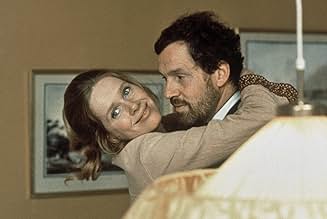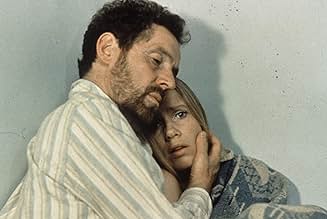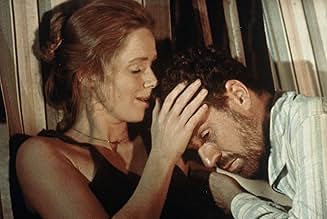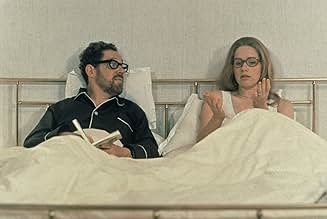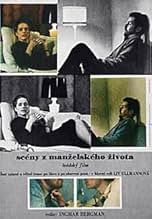Dieci anni nel matrimonio di Marianne e Johan.Dieci anni nel matrimonio di Marianne e Johan.Dieci anni nel matrimonio di Marianne e Johan.
- Premi
- 3 vittorie totali
Sfoglia gli episodi
Recensioni in evidenza
Scenes from a Marriage (the TV version, even as the theatrical cut is still very good and worth the time if the only copy available) is an intimate, naturalistic portrait of a couple, who at first are seemingly happy, then aren't, then try and find out where they go wrong. It's involving drama at its nexus, and for those who love the theater it's an absolute must see (aside from the theme, no music, all talk). Johan and Marianne are two of Bergman's most interesting, true characters (among his countless others) that he's ever presented, and like many other film artists, you can tell he's lived through at least some if not most of the emotions and trials these characters have been through.
Along with several supporting characters, two of the more notable ones played by Bibi Andersson and Malmjso are a perfect contrast in the first episode of the series. The conflicts that are established throughout the series never pay-off in a mis-fire. Craft-wise there is almost no style except for the minimal lighting by the great Sven Nykvist. And the dialog that goes on between the two leads goes from amusing to tragic, from romantic to bleak, and with all the emotions that I (as one who's never been married) can only guess can be as so. Bergman's script would be just that, a poignant, very profound lot of bits between two people more or less on paper, if not for Liv Ullmann and Erland Josephson. They turn on the emotions intuitively, like they've been these people somewhere else at some other time. Or rather, the husband and wife don't have very complicated jobs or economic situation, but the problems lie on the emotional plane, and the intellect they try to put to it. Johan loves another woman, how does that affect Marianne? Marianne asks for a divorce, how does that affect Johan? What will they do to cope? These are questions Bergman poses for his actors, among plenty of others, and they pull off the emotional cues off of each other like the most wonderful theatrical pros.
It's hard to find anything wrong with their acting, cause they don't over-do it (unless you're not into Marianne's changes in feeling in some scenes, which could be understandable), and the bottom line is that despite it being in Europe thirty years ago, it's highly possible these people could be in your house, or in your neighbor's house. Ullmann's Marianne is the 180 of her character from Persona, who could only let out emotions once or twice, mostly as an observer. Josephson's Johan is complex behind is usually sarcastic and simple demeanor- what drives him to do what he does in episode three, or in four? What will the conclusion lead to? Bergman creates a drama that is never boring, never diluted, and asks us to search for ideas about love and relationships we sometimes try and push away. It's a superb, concise treatise about the nature of falling in and out of love, how to differentiate what love is, and essentially what a marriage is. I can't wait to see the sequel, Saraband, which is Bergman's (definite) last film.
Along with several supporting characters, two of the more notable ones played by Bibi Andersson and Malmjso are a perfect contrast in the first episode of the series. The conflicts that are established throughout the series never pay-off in a mis-fire. Craft-wise there is almost no style except for the minimal lighting by the great Sven Nykvist. And the dialog that goes on between the two leads goes from amusing to tragic, from romantic to bleak, and with all the emotions that I (as one who's never been married) can only guess can be as so. Bergman's script would be just that, a poignant, very profound lot of bits between two people more or less on paper, if not for Liv Ullmann and Erland Josephson. They turn on the emotions intuitively, like they've been these people somewhere else at some other time. Or rather, the husband and wife don't have very complicated jobs or economic situation, but the problems lie on the emotional plane, and the intellect they try to put to it. Johan loves another woman, how does that affect Marianne? Marianne asks for a divorce, how does that affect Johan? What will they do to cope? These are questions Bergman poses for his actors, among plenty of others, and they pull off the emotional cues off of each other like the most wonderful theatrical pros.
It's hard to find anything wrong with their acting, cause they don't over-do it (unless you're not into Marianne's changes in feeling in some scenes, which could be understandable), and the bottom line is that despite it being in Europe thirty years ago, it's highly possible these people could be in your house, or in your neighbor's house. Ullmann's Marianne is the 180 of her character from Persona, who could only let out emotions once or twice, mostly as an observer. Josephson's Johan is complex behind is usually sarcastic and simple demeanor- what drives him to do what he does in episode three, or in four? What will the conclusion lead to? Bergman creates a drama that is never boring, never diluted, and asks us to search for ideas about love and relationships we sometimes try and push away. It's a superb, concise treatise about the nature of falling in and out of love, how to differentiate what love is, and essentially what a marriage is. I can't wait to see the sequel, Saraband, which is Bergman's (definite) last film.
There are few other films that have the direct authenticity of this one. It is very frank, honest, tender, and heartbreaking. The performances of the two primary actors are amazing. Never once did I doubt their sincerity. In every single scene they overwhelmingly conveyed the intense and nuanced emotions of the couple. I use the word "overwhelmingly" because that is exactly what it is. At times it is hard to watch. Especially the scene in which Johan admits his infidelity. I could feel Marainne's hurt/anger/confusion. There are moments of intense tenderness, as in the last scene where Johan comforts Marianne after her nightmare. To be sure, the actors had some incredible material with which to work. Bergman knows human nature as much as any of modern writer. His dialog is poetic at times, and achingly authentic at others. They way the couple eviscerates and dissects each other is alarmingly, yet honest. Rarely is a character saying what they actually feel. Rarely do the characters know what they feel. They, like many people, really are "emotional illiterates." Bergman's direction is minimal, and that is what makes it so effective. The emphasis is completely on the characters and their existences. This is a powerful, evocative film. And I have seen only the theatrical version. I can imagine the full TV version is even more detailed.
Ohmygod. Liv Ullman really deserved an Oscar for this one, as did Bergman. WOW- not many movies are this honest, this heartbreaking, this true, and this tumultuous- we see two people, in and out of a relationship over fifteen years, experiencing all the pain, loss, love, hate, anger, jealousy, denial, sadness, and so on that finding one's soul-mate brings, stretched out long-term.
Not many movies even come close to this one's brutality in its genuine awareness of people. Most modern films (and television, for that matter) cannot even come close to the psychological precision of Bergman's films. Perhaps "Scenes from a Marriage" is his best work- more accessible than "Wild Strawberries", more compelling than "Persona." This is definitely a film to seek out.
Not many movies even come close to this one's brutality in its genuine awareness of people. Most modern films (and television, for that matter) cannot even come close to the psychological precision of Bergman's films. Perhaps "Scenes from a Marriage" is his best work- more accessible than "Wild Strawberries", more compelling than "Persona." This is definitely a film to seek out.
I used to think that I knew a thing or two about marriage having been married for as long as I have but nothing from my experience had prepared me for the merciless and deep dissection of Marriage: Bergman Style. When we meet Johan and Marianne for the first time, they have been happily (or so it seems) married for ten years. They have two daughters; they are still young, very attractive, healthy, educated, well off, and they seem to love each other very much. But Bergman is not interested in happy families all happy families are happy in the similar ways. Like Tolstoy many years before him, Bergman explores the second part of the formula All unhappy families are unhappy in their unique ways.
Bergman and his leading actors Liv Ullmann and Arland Josephson give one of the most truthful, honest, heartbreaking and credible portraits of a couple, one of the most intense character studies ever done on film. For five hours, we share twenty years from the lives of Johan and Marianne as well as their love, hate, misunderstandings, insecurities, anger, jealousy, denial, sadness, pain, despair, and loss. We witness the moments of incredible tenderness and unexpected and shocking violence, both physical and mental. There are no depth that they have not descended in the search of themselves and the meaning of their relationship.
There are actually four marriages Bergman studies in "Scenes from a Marriage" none of them is happy, all are miserable. Bergman does not deny the possibility of finding a soul mate but his opinion on the modern marriage is quite pessimistic.
It felt like Bergman was saying - marriage is dead, long live love. For hours after the film was over, I could not shake off the sadness and pessimism of it. Only later I realized that even if four marriages in Bergman's film were disastrous, it does not necessarily mean that all couples in the world are or have to be that miserable. Bergman wrote and directed Scenes from a Marriage in 1973 when he was in his 5-th marriage, the one that would last for 24 years until his wife died. He brought in the screenplay (I think so but I may be wrong) the bitterness, resentment, anger and disappointments from his previous four marriages - maybe that's why the film is sometimes almost impossible to watch?
"Scenes from a Marriage" is a masterpiece but it may leave you devastated and emotionally exhausted. I watched the original 5-hours TV version and did not even bother with three hours version. 10/10
Bergman and his leading actors Liv Ullmann and Arland Josephson give one of the most truthful, honest, heartbreaking and credible portraits of a couple, one of the most intense character studies ever done on film. For five hours, we share twenty years from the lives of Johan and Marianne as well as their love, hate, misunderstandings, insecurities, anger, jealousy, denial, sadness, pain, despair, and loss. We witness the moments of incredible tenderness and unexpected and shocking violence, both physical and mental. There are no depth that they have not descended in the search of themselves and the meaning of their relationship.
There are actually four marriages Bergman studies in "Scenes from a Marriage" none of them is happy, all are miserable. Bergman does not deny the possibility of finding a soul mate but his opinion on the modern marriage is quite pessimistic.
It felt like Bergman was saying - marriage is dead, long live love. For hours after the film was over, I could not shake off the sadness and pessimism of it. Only later I realized that even if four marriages in Bergman's film were disastrous, it does not necessarily mean that all couples in the world are or have to be that miserable. Bergman wrote and directed Scenes from a Marriage in 1973 when he was in his 5-th marriage, the one that would last for 24 years until his wife died. He brought in the screenplay (I think so but I may be wrong) the bitterness, resentment, anger and disappointments from his previous four marriages - maybe that's why the film is sometimes almost impossible to watch?
"Scenes from a Marriage" is a masterpiece but it may leave you devastated and emotionally exhausted. I watched the original 5-hours TV version and did not even bother with three hours version. 10/10
"Scenes From A Marriage" is quite simply that: we meet Marianne & Johan ten years into their union & we witness half a dozen scenes of their lives. I'm not married, but I have of course known many people, family & friends, who were married & who talked, acted, & lived much like this couple does. That they are well-educated & affluent is somewhat irrelevant - married couples often seem to be keeping a certain secret (some keep it better than others) that they disguise with contentment, ritual, obligation, affection. Most of the time they keep this secret even from themselves. This movie is about the gradual discovery of the two main characters of the nature & ramifications of that secret.
As far as Bergman films go, it's strangely pretty, in color, with two attractive leads. But I think perhaps Bergman (& Sven Nykvist) sought to give us a sense of familiarity with the suburban, middle-class surroundings to lure us into a false sense of the security of the marriage in question. Without giving anything away, I suggest that this film is no less dark & heavy than other Bergman films; it rather goes for the heart in the way that you often wish modern dramas about relationships would. It's not trite, nor contrived, nor easily resolved. It's wise as life.
The movie was edited down by Bergman from a six-episode television series, which comprise the "scenes." The cast is great, but it's Ullmann & Josephson's show, & Ullmann is such a magnificent actor that I marvel at her expressive face, which Bergman smartly keeps his camera on.
It's unbearably wise, & sometimes difficult, but there aren't many films out there as honest as this one.
As far as Bergman films go, it's strangely pretty, in color, with two attractive leads. But I think perhaps Bergman (& Sven Nykvist) sought to give us a sense of familiarity with the suburban, middle-class surroundings to lure us into a false sense of the security of the marriage in question. Without giving anything away, I suggest that this film is no less dark & heavy than other Bergman films; it rather goes for the heart in the way that you often wish modern dramas about relationships would. It's not trite, nor contrived, nor easily resolved. It's wise as life.
The movie was edited down by Bergman from a six-episode television series, which comprise the "scenes." The cast is great, but it's Ullmann & Josephson's show, & Ullmann is such a magnificent actor that I marvel at her expressive face, which Bergman smartly keeps his camera on.
It's unbearably wise, & sometimes difficult, but there aren't many films out there as honest as this one.
Lo sapevi?
- QuizAccording to an interview with Ingmar Bergman, after the TV mini-series was broadcast in Sweden, the divorce rate in Sweden increased substantially and the number of married couples who seek marriage counseling also doubled.
- Curiosità sui creditiThe end credits aren't shown on-screen but read by director and writer Ingmar Bergman, while "a beautiful picture of Fårö" is shown (different for each episode). Bergman himself is not credited at all.
- Versioni alternativeBergman prepared a four-hour version of "Scenes from a Marriage," hoping it would be shown as a two-part film. It never appeared in the US, although the original six-hour mini-series was shown on PBS after the 168 minute cut had played theatrically.
- ConnessioniEdited into Scene da un matrimonio (1974)
- Colonne sonoreConcerto for violin, strings & continuo in B flat major, Op. 10, No. 1
(uncredited)
Written by Tomaso Albinoni
A short extract is played during the very beginning and end of each episode (it's not featured in the theatrical version)
I più visti
Accedi per valutare e creare un elenco di titoli salvati per ottenere consigli personalizzati
- How many seasons does Scenes from a Marriage have?Powered by Alexa
Dettagli
- Data di uscita
- Paese di origine
- Sito ufficiale
- Lingua
- Celebre anche come
- Scenes from a Marriage
- Luoghi delle riprese
- Azienda produttrice
- Vedi altri crediti dell’azienda su IMDbPro
- Tempo di esecuzione
- 50min
- Mix di suoni
- Proporzioni
- 4:3
Contribuisci a questa pagina
Suggerisci una modifica o aggiungi i contenuti mancanti

